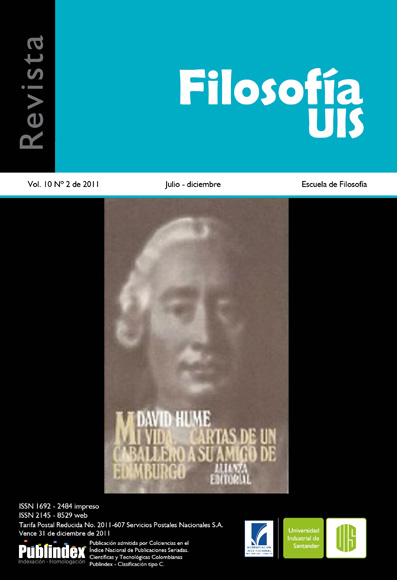Published 2011-10-10
Keywords
- Kant,
- judgement,
- nature,
- knowledge,
- rules
How to Cite
Copyright (c) 2011 Matías Hernán Oroño

This work is licensed under a Creative Commons Attribution 4.0 International License.
Abstract
I analyze the importance that acquires Kant’s third Critique in the level of empirical knowledge of nature. It is true that the aesthetic and teleological judgments of the Critique of Judgment do not provide knowledge of the nature. Nevertheless, the principle of purposiveness situated in the base of the above mentioned judgments has important implications for empirical knowledge. With this I try to suggest that the cognitive theory raised in the Critique of the Pure Reason was enriched by the own contributions of the Critique of Judgment, in the measure in which the latter work shows dimensions of the human knowledge that were not contemplated in the first Critique.
Downloads
References
- Del Luján Di Sanza, Silvia (2010). Arte y naturaleza. El concepto de “Técnica de la naturaleza” en la Kritik der Urteilskraft de Kant, Buenos Aires: Del Signo.
- Kant, Immanuel (1902). Kant’s gesammelte Schriften, hrsg. von der Preussichen und der Deutschen Akademie der Wissenschaften, Berlín.
- Kant, Immanuel (1992). Crítica de la facultad de juzgar, traducción, introducción, notas e índices de Pablo Oyarzún, Caracas: Monte Ávila.
- Kant, Immanuel (2005). Prolegómenos a toda metafísica del futuro, traducción de Julián Besteiro, Buenos Aires: Losada.
- Kant, Immanuel (2007). Crítica de la razón pura, traducción notas e introducción de Mario Caimi, Buenos Aires: Colihue.
- Kant, Immanuel (2010). Lógica, traducción, prólogo y notas de Carlos Correa,
- Buenos Aires: Corregidor.
- Makkreel, Rudolf (1990). Imagination and Interpretation in Kant. The Hermeneutical Import of the Critique of Judgment, Chicago y Londres: The University of Chicago Press.
- Zammito, John (1992). The Genesis of Kant’s Critique of Judgment, Chicago y Londres: The University of Chicago Press.
